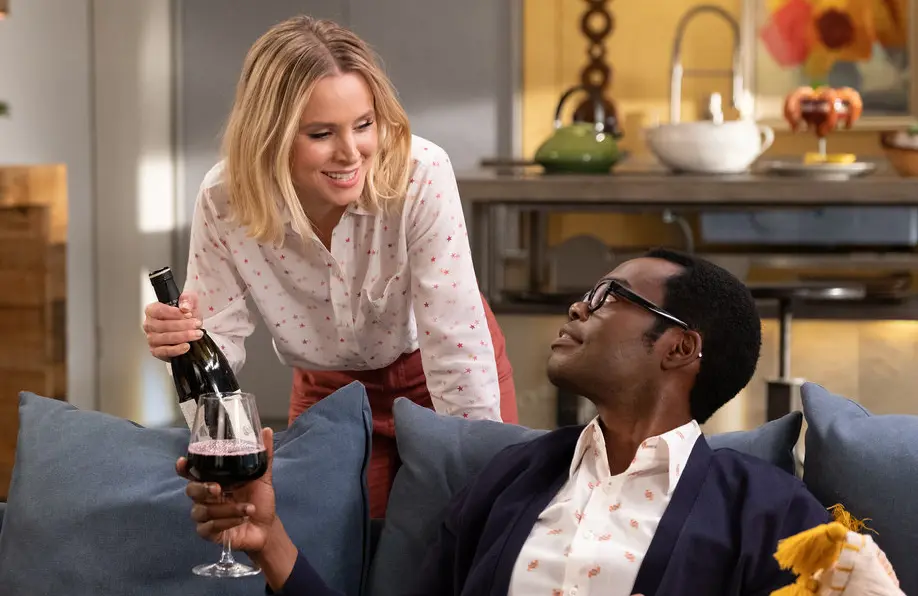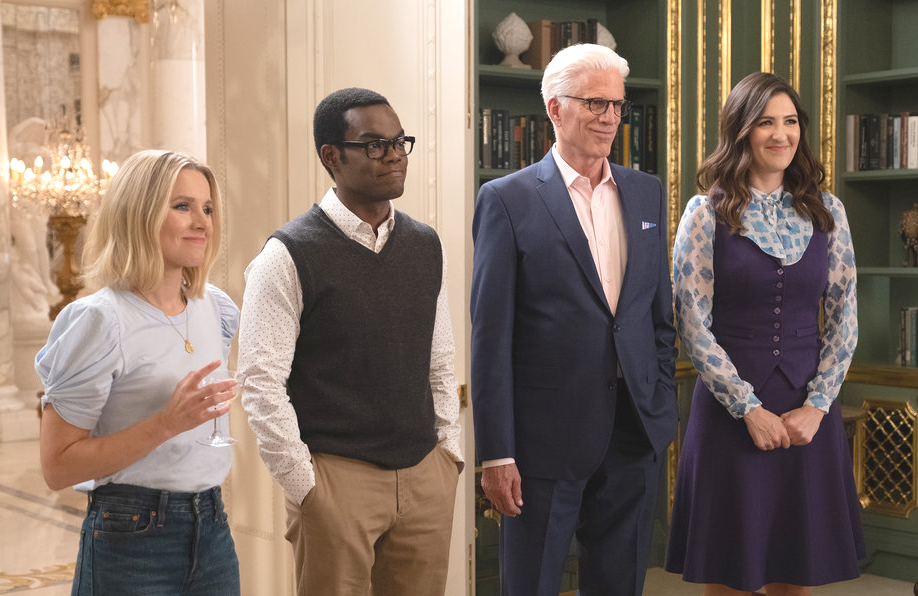The Good Place Couldn’t Go on Forever, So it Did the Next Best Thing
-
 Kristen Bell and William Jackson Harper in image from "Whenever You're Ready," the series finale of The Good Place. (Photo: Colleen Hayes/NBC)
Kristen Bell and William Jackson Harper in image from "Whenever You're Ready," the series finale of The Good Place. (Photo: Colleen Hayes/NBC)NBC’s The Good Place served up a satisfying conclusion Thursday night that went down easily, with notes of Groundhog Day, Six Feet Under, and redwood. Spoilers follow …
Five hundred years ago, when Sir Thomas More was trying out names for his mythical city where everyone lived in perfect harmony and equality, he settled on Utopia because it was a pun. Sir Thomas, who could no more imagine his book inspiring a thousand hippie communes than he could imagine his head on a platter, was trying to keep it light. So he chose a homonym, U/Eu-topia, that to the hearer sounded like both “no place” and “the good place.” After all, the whole idea of Utopia was a joke. Who would want to live in a perfect, wonderful, finished world … forever??
That was the question contemplated in last week’s penultimate imstallment of NBC’s The Good Place. After four seasons, 51 episodes, and countless iterations of Jeremy Bearimy, it seemed like our heroes had all finally arrived at their storybook ending. No more being told they were in Heaven when they were actually in Hell. No more being rebooted over and over by demons getting their jollies torturing humans. This was the real deal, a life of endless leisure and endless adventures through those sparkly green doors over there.

Best of all, after 500 years of dormancy, the nice hereafter was about to start filling up, thanks to a system tweak by Michael, Ted Danson’s cosmic architect. Over 25 hours of scripted television, Michael went from evil genius to middle-management mensch, evolving as subtly as the platypus. In last week’s episode, he convinced the judge of the entire universe — a Netflix-binging bureaucrat played by Maya Rudolph — to link the fate of humanity to merit. Do good things on Earth, enter Good Place. Easy sleazy! Suddenly Utopia needed a lot more beachfront.
Or did it? What exactly does one do in the perfect place, day after day, year after year, forever? It’s the same question that any bored adolescent would ask about Heaven, and last week we learned the answer wasn’t pretty. If you’re virtuous ancient philosopher Hypatia of Alexandria (aka Lisa Kudrow), you spend eternity drinking milkshakes whileyour brain slowly turns to mush.
And that led to a second, and far more fateful, tweak to the system: If a human decides she, or he, is tired with the Good Place, Michael announces, they simply “walk through one last door and … be at peace.”
After that announcement was made, two things happened. First, a reporter from Variety, of all places, called up the show’s creator, Mike Schur, to badger him over the ethics of euthanasia. Second, the show’s more perceptive fans figured out how this week’s finale was going to play out. The exit door would be the device by which each beloved cast member on The Good Place would get one last moment with the audience before stepping into nothingness.
All that was left was the goodbyes, and Thursday’s 1-hour, 12-minute finale delivered those in a bittersweet mix of whimsy and moral seriousness befitting the first network comedy based on a foundational ethics text.

Fittingly, the final shoutout to T. M. Scanlon’s book What We Owe to Each Other belonged to Kristen Bell’s Eleanor, the human whose surprisingly deep backstory allowed a deeper and richer evolution than any other character on the show. Viewers eventually discovered that Eleanor’s comically selfish approach to life stemmed from being broken by her alcoholic parents, whom she kissed off with a line — “I won’t owe you anything” — that became her life’s motto. At least, until Chidi (William Jackson Harper) came along. By realizing her moral and emotional debt to Chidi, Eleanor in turn compelled Chidi to do something he’d spent a lifetime avoiding: making a choice, for her.
And then they lived happily ever after … until they didn’t. In a way, The Good Place was a kind of answer to the question posed by the final scene of Groundhog Day: Once you’ve achieved total human enlightenment, and mastered every moment, what’s left? This dilemma played out in the finale’s most poignant moment, when Eleanor quoted the last line of Scanlon’s book to Chidi. All human relationships are constantly revising the rules of engagement to keep the bond strong and supple. Scanlon writes that “the search for how to find those rules will go on forever.” Forever??
Chidi sees the flaw in this argument before Eleanor does. He asks for his release, and at first she resists, using a number of ploys, including that old-Eleanor standby, emotional manipulation. But she’s just putting off the inevitable. As we learned last week, it’s in the nature of all good things, like vacations, to have an ending.
In a pleasant surprise, resident humanitarian Tahani (Jameela Jamil) was allowed to sidestep the portal into nothingness, successfully lobbying Michael for a systems architect job improving the Good Place, and doing such a standup job that she even won over Judge Maya and Lucifer’s stand-in, Shawn (Marc Evan Jackson).To no one’s surprise, Janet (D’Arcy Carden) remained to the end, friendly and helpful but exhibiting obvious signs of human warmth as she ushered departees to the redwood forest. (When Janet informs Eleanor that Shakespeare recently made his stage exit, Eleanor, in the night’s best line, declares that the Bard’s “last 4,000 plays weren’t nearly as good as the plays he wrote on earth. I mean, did you see The Tempest II: Here We Blow Again? Woof.”)
And yet, Janet’s parting with the guileless love of her life, Jason (Manny Jacinto), actually hit me harder than the Chidi-Eleanor farewell. After finally achieving a perfect score on the NFL Madden game, with his father by his side and Blake Bortles as his QB, Jason matter-of-factly declares his life complete and throws himself a huge bash. “I’ll never forget this night,” he sighs afterward, quickly adding, “… until I pass through that door and dissolve into the universe.”
To that point, The Good Place isn’t actually a moral universe, despite what you might read in Variety. It’s a comic universe, like the original fashioned by Thomas More. Much as we may love it, the show’s architect (also named Michael) was contractually obligated to close it down after this episode. The fact that it ran a bit long tells you it was hard for Schur and his writers to let go, especially knowing there would be no prequels (we’ve seen the flashbacks) nor a revival (how exactly would you pull that off?).
So we’re left with the words of the one person I couldn’t imagine the show making it this far without — Kristen Bell. “The show ended too soon,” she told Seth Meyers on the NBC aftershow. “You wanted — maybe we did — more of it, but it’s what you get. It’s a little too short, just like life.”
People are talking about The Good Place finale in our forums. Join the conversation.
Aaron Barnhart has written about television since 1994, including 15 years as TV critic for the Kansas City Star.
TOPICS: The Good Place, NBC, Kristen Bell, Maya Rudolph, Michael Schur, Ted Danson, Series Finales